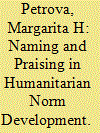| Srl | Item |
| 1 |
ID:
167981


|
|
|
|
|
| Summary/Abstract |
To examine the early development of humanitarian norm cascades, the author focuses on the processes that led to the adoption of the 1997 Mine Ban Treaty and the 2008 Convention on Cluster Munitions. Even though major military powers like the United States, Russia, and China opposed these initiatives, the latter set in motion quick norm cascades that brought about international legal norms stigmatizing land mines and cluster munitions. It is conventionally asserted that international norms emerge either due to great power backing or despite great power opposition, but the author argues that new norms can also take off because of great power opposition. When ngos and leading states actively foster normative change, a particular type of norm cascade is engineered—one generated by different mechanisms and starting earlier than postulated in the literature. Early norm cascading is driven not by emulation of peers and ngo naming and shaming of laggard states, but rather by leadership aspirations and naming and praising.
|
|
|
|
|
|
|
|
|
|
|
|
|
|
|
|
| 2 |
ID:
148028


|
|
|
|
|
| Summary/Abstract |
In 2006, Norway launched a stand-alone process to negotiate a ban on cluster munitions. The United Kingdom (UK) reluctantly joined the process to keep it within acceptable bounds. The UK acted as a spoiler in the negotiations. Yet, in the end, it agreed to ban all cluster munitions and became a champion of the new treaty. Why? I argue that two factors constrained and enticed the UK to go along with the process. First, small states and non-governmental organizations (NGOs) structured the negotiations to disadvantage potential opponents. Second, NGOs also used shaming and praising to define the “desirable” UK policy. Not only did the UK accept a comprehensive ban, but it also started championing it as a result of two mechanisms—“cooperative bargaining” at the end of negotiations that led to a fair compromise and “mobilization of pride” by NGOs praising it for supporting the new norm. Whereas usually the success of weak actors in international negotiations is attributed to the persuasive power of their arguments, I show that strategic action by small states and NGOs may prove crucial in engineering the conditions both for their success and the rhetorical entrapment of stronger actors, such as the UK.
|
|
|
|
|
|
|
|
|
|
|
|
|
|
|
|
| 3 |
ID:
160881


|
|
|
|
|
| Summary/Abstract |
The article examines the roles of NGOs in banning cluster munitions that resulted in the 2008 Convention on Cluster Munitions and the campaign against landmines in the 1990s. It argues that NGOs have managed to move questions about the use of force from the closed decision-making sphere of military commanders and arms control diplomats into open public debate. Thus NGOs have simultaneously desecuritised the use of force by states, securitised certain weapons technologies, and made human beings the referent object of security. This has marked a shift from state security and strategic disarmament to human security and humanitarian disarmament, without fundamentally challenging the laws of war. However, in contrast to realist views that only militarily useless weapons ever get banned and radical critical perspectives that see new legal regimes as legitimating war and US hegemony, I argue that NGOs have engaged in immanent critique of military arguments and practices based on prevailing principles of international humanitarian law. The resulting weapon ban treaties have both restrained US policy and undermined its legitimacy. The article explores the discursive choices that underpinned the remaking of the security agenda by NGOs and their role as de/securitising actors and emancipatory agents of change.
|
|
|
|
|
|
|
|
|
|
|
|
|
|
|
|